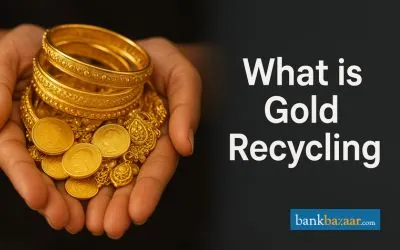Gold Recycling Process
Gold recycling is a growing trend in both the jewellery and investment sectors. It involves reusing existing gold from old jewellery, broken pieces, coins, or even e-waste to create new, refined gold products. As environmental awareness grows and gold prices continue to rise, recycling your gold offers a smart, sustainable, and cost-effective way to unlock value without mining new resources.
What is Gold Recycling?
Gold recycling refers to the process of collecting, refining, and reusing gold from old items. Whether it’s an outdated necklace, damaged ring, or unused coin, the gold in it doesn’t lose its value or purity when melted and refined. This recycled gold is just as good as newly mined gold — making it an excellent choice for both manufacturers and consumers.

The Gold Recycling Process – Step by Step
- Collection & Assessment Individuals bring in old gold items to a jeweller, gold recycler, or refinery. The items are examined for weight and karat (purity).
- Purity Testing Non-destructive methods like karat meters or X-ray fluorescence (XRF) are used to accurately measure the gold content without damaging the piece.
- Melting The gold is melted in high-temperature furnaces. This process separates impurities like stones, copper, or silver.
- Refining & Purification After melting, the gold is further refined to reach high purities — often up to 99.9% (24K).
- Recasting & Reuse The purified gold is then converted into coins, bars, or new jewellery pieces. Some jewellers even allow customers to use recycled gold to create custom designs.
Why You Should Recycle Your Gold
Environmentally Friendly
Recycling gold significantly reduces the need for new mining, which causes deforestation, water pollution, and carbon emissions. It’s a cleaner, more eco-conscious approach to sourcing gold.
Unlock Financial Value
You can exchange old or unused gold for instant cash, gift vouchers, or new jewellery — turning dormant assets into financial gain.
Support the Circular Economy
Gold recycling promotes a circular economy by reusing existing resources instead of depleting new ones. It minimizes waste and supports sustainability.
Retain Gold’s Value & Purity
Unlike other materials, gold does not degrade. Once refined, recycled gold is identical in quality and value to newly mined gold.
Common Sources of Recycled Gold
- Old or Broken Jewellery: Necklaces, bangles, rings, earrings, chains.
- Gold Coins & Bullion: Outdated or inherited gold items.
- Industrial Waste: Gold used in electronics, dental alloys, and medical devices.
- E-Waste: Old mobile phones, circuit boards, and computer parts contain trace amounts of recoverable gold.
Where to Recycle Gold in India?
Gold recycling is now more accessible than ever. You can recycle gold through:
- Jewellery Showrooms: Many reputed brands offer gold exchange or recycle-for-redesign services.
- Gold Refining Units: Licensed refineries accept old gold and convert it into pure forms.
- Digital Gold Platforms: Some fintech companies accept physical gold for conversion or offer digital gold credits.
- Gold Buying Companies: Certified buyers purchase your old gold at live market rates.
Tips Before Recycling Your Gold
- Get Multiple Quotes – Don’t settle on the first evaluation. Compare rates from 2–3 jewellers or buyers.
- Insist on Purity Testing – Always ask for a karatmeter/XRF purity test before agreeing to a price.
- Understand Deductions – Some refiners deduct melting, wastage, or service charges. Be clear on these before proceeding.
- Keep Documentation – Ask for a proper bill or receipt for your transaction. It helps in valuation and resale in future.
Gold Recycling vs Selling vs Pledging
Feature | Recycle Gold | Sell Gold | Pledge Gold |
Purpose | Exchange for new use or cash | Instant cash value | Loan against your gold |
Return of Original Item | No | No | Yes (after repayment) |
Ideal For | Redesigning or maximizing value | Liquidating unused gold | Emergency short-term needs |
Market Rate Based? | Yes | Yes | Yes, but with interest |
Risk Level | Low | Low | Medium (due to loan interest) |
Recycling your old gold is more than just a financial decision — it’s a responsible choice for the planet and your portfolio. Whether you're planning to upgrade your jewellery or simply want to unlock hidden value, gold recycling is secure, sustainable, and rewarding.
FAQs on Gold Recycling
- What is gold recycling?
Gold recycling is the process of melting and refining old gold items (like jewellery or coins) to extract pure gold, which can then be reused to create new products or exchanged for value.
- Is recycled gold as pure as new gold?
Yes. Once refined, recycled gold is identical in purity and quality to newly mined gold. Purified recycled gold often reaches up to 99.9% purity (24K).
- Can I recycle damaged or broken jewellery?
Absolutely. Even if a piece is broken or old-fashioned, it still retains its gold content and can be melted down for recycling or redesign.
- Is gold recycling environmentally friendly?
Yes. It significantly reduces the need for mining, helping conserve natural resources and lower carbon emissions.
- What documents are needed to recycle gold?
In most cases, a valid ID proof is sufficient. If you're exchanging a large quantity, especially with a refinery, some may ask for a PAN card (as per Indian regulations).
- Will I get full value for my recycled gold?
You will get paid based on the current market rate for gold, minus any applicable deductions (melting loss, service fee). Always confirm the final rate before proceeding.
- Can I recycle gold into new jewellery?
Yes. Many jewellers allow you to melt your old gold and reuse it to craft new, modern designs. This can save you money compared to buying new jewellery outright.

Disclaimer
Credit Card:
Credit Score:
Personal Loan:
Home Loan:
Fixed Deposit:
Copyright © 2026 BankBazaar.com.